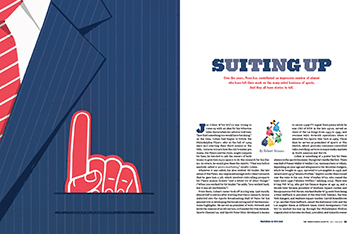
Over the years, Penn has contributed an impressive number of alumni who have left their mark on the many-sided business of sports. And they all have stories to tell.
BY ROBERT STRAUSS | Illustrations by Chris Gash

Joe Cohen W’68 WG’70 was trying to come up with an idea for his Wharton MBA thesis when his advisor told him: “Just find something you would have fun doing.” At the time, Cohen had begun to follow the Philadelphia Flyers, who in the fall of 1969 were just starting their third season in the NHL. Curious to learn how the city’s winter pro teams, the Flyers and the 76ers, might compete for fans, he decided to ask the owners of both teams to give him $500 apiece to do the research for his thesis. In return, he would give them the results. “That was before anybody called it sports marketing,” recalls Cohen.
Whatever it was called, his idea worked. Ed Snider, the late owner of the Flyers, was impressed enough with Cohen’s research that he gave him a job, which involved cold-calling prospects for Flyers season tickets “and a whole lot of other things.” (“When you worked for Ed Snider,” he adds, “you worked hard, but it was all worthwhile.”)
From there, Cohen’s career took off in a big way. Last month, almost half a century after starting that thesis research, he was inducted into the Sports Broadcasting Hall of Fame for his seminal role in developing the broadcasting end of the business. Some highlights: He served as president of MSG Network and drove the creation of an HD service; co-founded the USA Network, Sports Channel LA, and Sports Time Ohio; developed a means to secure a pay-TV signal from piracy while he was CEO of HTN in the late 1970s; served as chair of the LA Kings from 1993 to 1995; and oversaw MSG Network operations when it absorbed Fox Sports New York in 1989. These days he serves as president of sports at The Switch, which provides customer-controlled video switching services in major media markets in North America and the UK.
Cohen is something of a poster boy for Penn alumni in the sports business—though he’s hardly the first. There was Hall of Famer Walter O’Malley C’26, visionary hero or villain, depending on your age and allegiance to the Brooklyn Dodgers, which he bought in 1950, uprooted to Los Angeles in 1958, and owned until 1979 [“Alumni Profiles,” Sep|Oct 2008]—then turned over the reins to his son, Peter O’Malley W’60, who owned the team until 1998 [“Alumni Profiles,” July|Aug 2015]. There was Irving Felt W’29, who got his finance degree at age 19, and a decade later became president of Madison Square Garden and the eponymous Felt Forum. Michael Burke W’39 went from being a Penn halfback to president of the New York Yankees, the New York Rangers, and Madison Square Garden. Carroll Rosenbloom C’30, another Penn halfback, owned the Baltimore Colts and the Los Angeles Rams at different times. David Montgomery C’68 WG’70 worked his way up through the Philadelphia Phillies organization to become its chair, president, and minority owner [“Squeeze Play,” July|Aug 1999]. And, of course, there are plenty in the business who have stayed outside the owners box, such as Jeff Luhnow W’89 EAS’89, general manager of the Houston Astros [“Alumni Profiles,” Mar|Apr 2013], and Stephen Karasik C’95 and Tyler Hale C’96, who shaped the coverage of CBS Sports [“Alumni Profiles,” Mar|Apr 2015].
All in all, a pretty distinguished list for a university that doesn’t have a formal degree-granting sports program or center. But good luck trying to find a linkage between a Penn—predominantly Wharton—education and its alumni presence in sports business.
“I don’t know that there is anything special,” says Kenneth Shropshire, the David W. Hauck Professor at Wharton, professor of legal studies and business ethics, and faculty director of the Wharton Sports Business Initiative (WSBI, which is essentially a sports business think tank, assisting on major research, giving seminars and conferences, and consulting for major sports organizations and unions). “One key, ironically, is the absence of a sports-specific major. Students have to seek it out. Similarly, few sports employers come to Penn to recruit—students have to seek them out and really want to work in sports. That may be a key distinction from institutions that do have sports-focused degrees.”
Over the years, as revenues have exploded, the business side of sports has become increasingly complex. When the elder O’Malley ran the Brooklyn Dodgers, for instance, he was involved in every decision, right down to player contracts. Now there are assistant general managers whose sole responsibility is handling contract negotiations. In the last 50 years, front-office staffs have gone from a couple of dozen to hundreds. There are myriad statistical and analytical jobs—for evaluating players as well as determining who will buy tickets and concessions and what the price thresholds should be—as well as positions in marketing, community outreach, even horticultural departments to care for the trees and flowers around stadiums.
That doesn’t even start to count the jobs that intersect with the teams. Agents, unheard of 50 years ago, have acquired enough power to become the stuff of blockbuster movies (see Maguire, Jerry). There has been a massive increase in companies looking for athletes to endorse their products and stadiums charging millions of dollars for naming rights.
“Every Fortune 500 company wants to have sports sponsorships and every team wants to attract them,” says Jim Kahler, executive director of Ohio University’s AECOM Center for Sports Administration. “There are jobs in sports marketing agencies and analytics and sales and social and digital media that just didn’t exist before.”
“Everything around sports has increased,” says Janet Fink, chair of the Mark H. McCormack Department of Sport Management at the University of Massachusetts. “Sponsorship dollars and advertising, and there are always more and more sports, like, say, UFC [Ultimate Fighting Championship]. There are just more jobs and it is more complicated than it used to be.”
Asked to name the most important factor driving these changes, Shropshire responds: “Technology, by far. The greatest success in sports business comes by being a step ahead in technology—and knowing how to monetize it.”

In 1975, Cohen had the responsibility for getting events at Madison Square Garden broadcast on a new communications medium known as cable television. By the end of the decade, he and his partners had founded the USA Network, and he took the lead in finding sports programming for the nascent cable network.
“We had about 85 Knicks and Rangers home games and a million-dollar investment, and that is what started the USA Network,” Cohen recalls. “It was a different time. The numbers were a whole lot smaller.”
The network then bought the rights for about 60 NBA games that it aired nationally for about $6,000 a game—less than $500,000 a year. Compare that with the nine-year, $24 billion deal the NBA signed in 2014 with Turner Broadcasting System and the Walt Disney Co., which works out to $2.67 billion a year and laid the foundation for a live-streaming online service.
Cohen soon became one of the go-to guys of sports cable television. He and an investor group started the Hughes Sports Network, then bought the Los Angeles area Channel Z in the late 1980s with the idea of turning it into an all-encompassing LA sports cable channel. In the early 1990s he reconnected with Snider, who had rolled his sports, arena, and television holdings into a company called Spectacor. Snider gave Cohen the go-ahead to start Spectacor West, which bid successfully for most Southern California sports broadcasting rights.
Over the years the Brooklyn-born Cohen bought and sold the Los Angeles Kings, was president of the MSG (Madison Square Garden) Network, did his own sports broadcasting deals, and acted as a consultant on others. But his most treasured memory is of March 8, 1971, during the hours leading up to the “Fight of the Century” between Muhammed Ali and Joe Frazier (promoted by Irving Felt), when Cohen was still a low-level employee at the Garden.
“My job that day was to make sure Ali had everything he wanted,” he recalls. “What he wanted to do was play checkers and watch television. So there I was, a young employee, and my job was to play checkers with the heavyweight champ, perhaps the most famous person in the world.”
Cohen attributes much of his success to personal relationships. He and NBA commissioner David Stern, for example, went to summer camp together in the Catskills.
“Everything is based on relationships,” he says, “and I have been lucky to know and keep in touch with many of the best people in the business.”

Even after Scott Rosner L’97 earned a master’s degree in sports management at the University of Massachusetts to supplement his experience helping out with the 1994 World Cup, he kept hearing from people whose opinions he trusted that the sports business was getting more complex and that it would behoove him to get a law degree as well. That fall he entered Penn Law School, and soon became a research assistant for Shropshire. After getting his law degree, he did some legal consulting with the NFL.
On the academic side, he started the sports-management program at Cazenovia College, taught sports law and sports management at Seton Hall University, then came to Wharton as a lecturer in 2002. He has since become a practice associate professor of legal studies and business ethics, and has been the faculty associate director of the WSBI since its inception in 2004. In addition to his teaching, he has done legal and strategy consulting with teams and leagues and been an expert witness for various clients. (He was, for instance, an expert witness for Northwestern University in the suit by its scholarship athletes, who had hoped to unionize and perhaps get salaries for playing university sports.)
“Teams and universities and leagues need to do both medium and long-term planning these days, and that is where I think I can help most,” says Rosner, who now co-hosts with Shropshire the weekly Wharton Sports Business Show on SiriusXM Business Radio. He and Shropshire co-wrote The Business of Sports , now in its second edition. (“The academy lacked a comprehensive casebook focused on the business,” says Shropshire, who has 11 more sports-related books to his credit.)
Rosner is also the academic director of the Wharton Sports Business Academy, which for the past six years has served as a summer camp for about a hundred high-school students from around the world who stay in the Quad and learn “the same stuff that undergraduates learn” about sports and business. “We want to have diversity on the professional level,” he says, “so we try to bring in that same sort of diversity—in income and background—to the program.”

As a girl who had fled from the revolution in Iran with her parents and came to America at age seven, Mori Taheripour WG’03 didn’t play sports when she was young. Her traditional family wasn’t quite ready for that. But just outside her window was a beckoning world where sports reigned supreme.
“Our apartment where we lived in Boston overlooked Fenway Park, and it was the heyday of the [Larry Bird-led] Boston Celtics when I was growing up,” says Teheripour. “I was supposed to be academic, which I was, and become a doctor, which I didn’t.
“When the lights were on at Fenway Park, it was magic,” she adds. “It was something that brought people and dreams together. There was this optimistic energy in sports and it stayed with me.”
Today Taheripour, a lecturer in legal studies and business ethics who co-founded the WSBI and serves as one of its faculty advisors, is one of the leaders in the sports world’s social-impact movement. She started working with both non-profits and for-profit programs and leagues, helping make sports a part of their “inclusion” initiatives. Since 2010 she has been a senior advisor for the United States Agency for International Development (US AID), helping to set up youth leadership programs (mostly centered around sports) in developing countries.
“It was a way to have an impact with public health as well,” she said. “Sports got kids motivated to do something positive, and it certainly had an effect on their health.”
An example is her consulting work with the NBA for its first sustained program in Africa, based in Senegal. She helped match the league and its players with local schools, building and maintaining courts and getting coaches to work with students.
“It was not just basketball drills I wanted to have, but teaching the values that sports embrace, from teamwork to resilience,” she explains. “Sports were the carrot and the platform, but leadership was the goal.”
Taheripour has also consulted with Peace Players International in such volatile areas as Cyprus, Israel, and Palestine, using basketball for conflict mitigation. Noting that the NBA bought into it “because they have a worldwide view of their sport,” she says it is “one of the best programs I have dealt with—it was business, but it was a program that really worked.”
Taheripour used the same idea when she helped Major League Baseball in one of its biggest foreign markets, the Dominican Republic. Her work in creating and sustaining education programs there supports the key premise: the more MLB invests in those local communities, the more players there can thrive.
Several years ago, she worked with NFL players to do public service announcements about famine in Africa, again for US AID. Instead of being a burden for them, she recalls, it was something they were glad to do. “They know inclusion is part of the game now—that everyone should benefit from sports.”

Steve Kauffman L’73, founder and president of the Malibu-based Kauffman Sports Management Group, has been an agent for four decades now. For many years he represented players, mainly basketball but also baseball (including Mets pitcher and broadcaster Ron Darling) and a few pro football players, including Chicago Bears All-Star linebacker Brian Urlacher. These days he represents coaches and executives. But his path was a circuitous one.
Shortly after graduating from Penn Law in 1973, having just embarked on a promising career as a tax attorney, Kauffman sat down to lunch with Stan Novak, a friend of his father-in-law. Novak was then coaching the Allentown Jets in the Eastern Basketball Association, the home of many wannabe and used-to-be NBA players.
“My father-in-law would always brag about me, so I owed him the favor,” says Kauffman, who told Novak during the lunch that he would be happy to do some volunteering in the league, just to do something in sports. “About three-quarters of the way in, Stan says, ‘Would you like to be commissioner?’”
Kauffman thought Novak was kidding. He wasn’t. Someone had to run the nuts-and-bolts of the league—scheduling, advertising, and the like—and Novak didn’t want to do it himself. So for a whopping $3,000 a year, Kauffman began spending weekends in places like Allentown, Wilkes-Barre, Scranton, and Syracuse. When investors from Anchorage, Alaska, decided they wanted a minor-league basketball team, he brought them in—sending teams to Alaska for the longest of road trips, at Anchorage’s expense. (That acquisition also prompted him to change the name of the league to the Continental Basketball Association.) Soon a few of the better players asked him to be their agent.
“Jerry Baskerville, Charlie Criss, they were wonderful guys,” says Kauffman. “Sometimes, being in the right place and not letting a chance go by changes your life.”
His recent shift from players to coaches and front-office executives fits the flow of his own life span, he says. As he moved into middle age, he discovered he would rather be hanging out with people closer to his age and mindset, primarily in his favorite sport, basketball.
“I know people talk about the low odds of becoming an NBA player, but think about how those odds are even slimmer for coaches,” says Kauffman. “There are only 30 of them at any one time. Those coaches are really smart—among the smartest people I have ever known. So right now, that is a great group to be with. I am always learning something. Don’t get me wrong, representing players was fun at the time, but this is like a new world as I get older.”
Kauffman says that all agents have their own styles and, to an extent, gimmicks to attract clients. Early on, he did play the Ivy League card. His agency partner had gone to Yale—as had Ron Darling, a prize for any agent.
“He said, ‘Let’s just write him a letter and say we are from Yale and Penn and would like to get to know him,’” Kauffman recalls of their pitch to Darling. “I thought that was crazy. How could that work?”
Somehow, it did. Darling was getting so many hard sells that the soft letter sold him. They met once, at a barbecue at Kauffman’s house, and Darling signed on.
“I learned that I only had to be myself,” Kauffman says. “If I lost someone because I wasn’t, then it wasn’t meant to be.”
Among his clients now are former NBA star Patrick Ewing, an assistant coach for the Charlotte Hornets; Steve Clifford, the Hornets head coach; Lionel Hollins, the head coach of the Brooklyn Nets; Paul Westphal, the former head coach of the Kings, Suns, and Supersonics; and Jeff Hornacek, the new coach of the New York Knicks.
“I had learned a lot about both sides of the business,” he says, “and was able to convince them that I could do for them what I had done for players.”
The business side of sports is not always the most romantic. For Rosner, the greatest risk for anyone working in it “is that we see how the sausage is made”—which is “not always the best thing,” he acknowledges. “I have tried not to get jaded by that.”
It helps that he now gets to see sports through the eyes of his 10-year-old daughter and seven-year-old son.
“My daughter is more of a recreational athlete, and my son, well, anything with a ball or an element of competition, from table hockey to a ninja warrior game, that is what he is about,” Rosner says. “I get to relive that thrill through them, and they get to reap the benefits of a dad who has a cool job.”
Robert Strauss is the author of Worst. President. Ever.: James Buchanan, the POTUS Rating Game, and the Legacy of the Least of the Lesser Presidents (Lyons Press, 2016).

